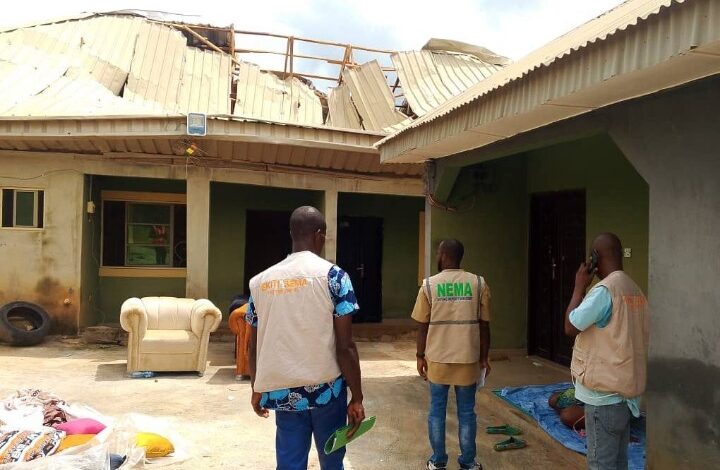NEMA conducts assessment of rainstorm disaster in Ado-Ekiti

April 29, 2025- Ado-Ekiti, Nigeria – The National Emergency Management Agency (NEMA) swiftly launched an assessment after a destructive rainstorm hit Ado-Ekiti on April 26, 2025.
Immediately, NEMA collaborated with the Ekiti State Emergency Management Agency and the Ekiti State Property Identification Agency to evaluate the damage.
According to NEMA’s official statement, the storm caused severe destruction, uprooting trees and demolishing buildings.

As a result, many residents faced displacement, and critical infrastructure suffered significant damage during the recent events.
Fortunately, no lives were lost in the incident; however, the economic impact remains substantial and continues to affect communities.
Moreover, the assessment team, led by Mr. Abogunrin Adesina, confirmed widespread roof damage across residential and commercial properties.
Additionally, fences collapsed, and some structures became unsafe for habitation.
Meanwhile, agricultural losses were devastating, particularly for poultry farmers.
Specifically, one farm reported losing 2,800 hens, dealing a major blow to local food production.
Furthermore, public facilities, including schools and health centers, suffered partial destruction.
As a result, recovery efforts must prioritize rebuilding these essential services.
Currently, NEMA is coordinating relief materials and temporary shelters for affected families.
Similarly, the agency is working with state authorities to restore normalcy swiftly.
However, long-term solutions, such as stronger building codes, are being considered to prevent future disasters.
In response, Ekiti State Governor Biodun Oyebanji has pledged support for victims, promising reconstruction aid.
Meanwhile, meteorologists warn of more extreme weather, urging residents to take precautions.
Therefore, NEMA is intensifying public awareness campaigns on disaster preparedness.
Moving forward, the agency will deploy more emergency response teams to high-risk areas.
Likewise, partnerships with NGOs will enhance relief distribution and rehabilitation programs.
Ultimately, these measures aim to strengthen community resilience against climate-related disasters.
For now, displaced families are receiving food, medical supplies, and temporary housing.
Additionally, engineers are assessing structural integrity to ensure safe returns.
Nevertheless, full recovery may take months, requiring sustained government intervention.
In conclusion, this disaster highlights Nigeria’s vulnerability to extreme weather. Proactive measures, including early warning systems, are crucial moving forward. Together, federal and state agencies must prioritize disaster risk reduction to safeguard lives and livelihoods.
Post Views: 14





